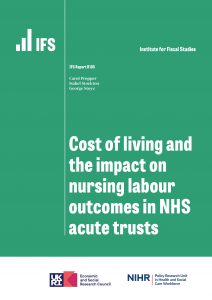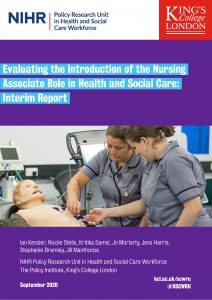 The following is the press release from our colleagues at the Institute for Fiscal Studies for the report published 24 February 2021: ‘Cost of living and the impact on nursing labour outcomes in NHS acute trusts’. The report is authored by Carol Propper, Isabel Stockton and George Stoye.
The following is the press release from our colleagues at the Institute for Fiscal Studies for the report published 24 February 2021: ‘Cost of living and the impact on nursing labour outcomes in NHS acute trusts’. The report is authored by Carol Propper, Isabel Stockton and George Stoye.
Improving the retention of NHS staff has been a long-term policy challenge, and will be of even greater importance in the aftermath of the Covid-19 pandemic. NHS pay is currently tightly regulated in order to reduce variation in pay for the same roles in different parts of the country and to stop hospitals competing for staff on the basis of pay. However, this regulation has consequences: a new report by researchers at the Institute for Fiscal Studies, as part of the National Institute for Health Research Policy Research Unit on Health and Social Care Workforce, shows that national pay-setting limits the flexibility of hospital trusts to respond to local conditions, exacerbating shortages in hospital nursing labour before the start of the pandemic. These shortages exist despite increases in the overall number of nurses working in the NHS.
Using novel administrative payroll data covering the entirety of the NHS acute hospital sector between 2012 and 2018, researchers find that in parts of England where house prices – a proxy of cost of living – have increased rapidly, the relative earnings of nurses in these areas have decreased compared to nurses living and working in areas with slower growth in living costs. This has translated into increased movement of staff between hospitals, and more exits from the hospital sector entirely among frontline nurses. Continue reading

 Richard Griffin MBE is Visiting Senior Research Fellow, King’s Business School. (869 words)
Richard Griffin MBE is Visiting Senior Research Fellow, King’s Business School. (869 words)